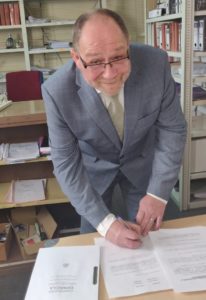Adios 2020 – Hello Spanish nationality!

Like some 7.8 billion others around the world, I was thankful to see the back of 2020. It was an awful year on every level – global, European, national and, for my family, personal.
It was however, also the year that I became a Spanish citizen, changing my name (albeit slightly) in the process!
It was a long three-year wait but on 21 February I swore my loyalty to the country’s 1978 constitution, (sort-of) renounced my British nationality and became one of 47 million other Spaniards here and elsewhere.
One of the well-known parts of the process is the requirement to pass two exams that show you have an acceptable knowledge of Spanish language and culture, as I think is also the case in a number of other EU countries and the UK.
I have seen criticism of this requirement in some of the British media (for all I know, there has been in other countries as well). It’s not a view I share. We are, after all, talking about becoming a national of a country, the equal of all others that live there. It’s a step that is significantly beyond being a legal resident, having “unlimited leave to remain” or whatever. It should require some commitment.
A lot of the criticism centres around the obscure nature of some of the questions, but I think that misses the point. As long as the body of questions and answers from which the exam is compiled is made public (as is the case in Spain), applicants can study them and memorise a selection of the trickiest. After all, I think it’s reasonable to expect people to make something of an effort if the “prize” is a passport. In any event, you only have to get 60% right, you can afford to not know the term of office of an ombudsman in Spain or the real name of Big Ben in London (5 years and the Elizabeth Tower respectively, in case you were wondering).
As for the language test, again, I think it’s a perfectly fair requirement. In Spain, they ask for A2 level within the Common European Framework of Reference for Languages, which requires the ability to “communicate in simple and routine tasks requiring a simple and direct exchange of information (…)”. If you want to become an equal citizen of a country I think that’s an entirely reasonable request.
I took these exams in 2017 along with my good friend Tim Foster and we duly passed both without any problem. Below is a photo of me signing the papers in the Civil Registry to become Spanish.
That was one of the most positive days from the horror of 2020. I think I speak for most of the world when I say let’s hope that 2021 is whole lot safer, healthier and happier!

Adiós a 2020 – ¡Bienvenido a la nacionalidad española!

Como unos 7.800 millones de personas alrededor del mundo, estaba encantado de ver el final de 2020. Fue un año espantoso a todos los niveles – global, europeo, nacional y, para mi familia, personal.
Sin embargo, también fue el año en que se me concedió la nacionalidad española – ¡con (ligero) cambio de nombre incluido!
Tuve que esperar tres años largos pero al final, el 21 de febrero, juré lealtad a la constitución, renuncié (más o menos) a la nacionalidad británica para ser uno más entre 47 millones de conciudadanos.
Uno de los requisitos más conocidos es el de aprobar dos exámenes para mostrar que uno tiene conocimientos aceptables de la lengua y la cultura española, tal y como tengo entendido es el caso en ciertos otros países de la UE y el Reino Unido.
He leído críticas de esta exigencia en algunos medios británicos (y los de otros países también, por lo que sé). No es una opinión que comparto. Al fin y el cabo, hablamos de ser un ciudadano del país en cuestión, igual que todos los demás que viven allí. Es un paso que va bastante más lejos de ser un residente, tener “permiso de establecimiento ilimitado” o lo que sea. Hace falta cierto compromiso.
Gran parte de estas críticas radican en la oscuridad de algunas preguntas, pero creo que esto es olvidarse de lo central . Siempre que el temario de los exámenes sea público y libremente disponible (como es el caso en España), los solicitantes pueden estudiar las preguntas más espinosas. Me parece de lo más razonable esperar que la gente haga un esfuerzo si el “premio” al final es un pasaporte. En todo caso, sólo hay que acertar a un 60%, puedes permitirte el lujo de no saber el mandato del defensor del pueblo en España o el nombre oficial del Big Ben de Londres (5 años y Elizabeth Tower o la Torre de Isabel, respectivamente, si te quedaste con la duda).
Pasándome a la prueba de idioma, otra vez, me parece un requisito de lo mas justificable. En España, se pide un nivel A2 dentro del Marco Común Europeo de Referencia para las Lenguas, que requiere que uno “sabe comunicarse a la hora de llevar a cabo tareas simples y cotidianas que no requieran más que intercambios sencillos y directos (…)”. Si quieres ser un ciudadano de un país en igualdad de condiciones, creo que es una petición perfectamente razonable.
Hice estos exámenes en 2017 con mi buen amigo, Tim Foster. Los dos aprobamos todo sin ningún problema. La foto de arriba es del momento en que firmé en el Registro Civil para hacerme español.
Aquel día fue uno de más positivos de ese nefasto 2020. Creo que puedo hablar de la inmensa mayoría del mundo cuando digo que ¡esperemos que 2021 sea un año mucho más sano, seguro y alegre!
Tim Foster says:
Congrats to you Bill … let’s hope that 2021 is a marked improvement on 2020!!!